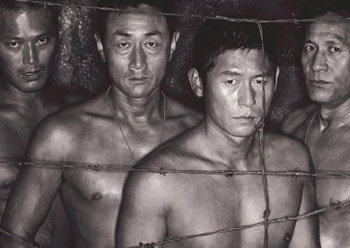Why Did They Turn Their Guns on Cheong Wa Dae?
Why Did They Turn Their Guns on Cheong Wa Dae?
Posted December. 23, 2003 23:12,

To rightfully judge Silmido, one needs to understand two things about Kang Woo-suk, who directed the film. These two factors are also the keys to undoing the misunderstandings surrounding the film.
Who is director Kang? First of all, the film was only possible thanks to his power as the ten-year Power Man of Chungmuro. Also, he made the film just the way he wanted, without anybody elses interference. He is the only director who can spend a 10 billion won production fee on a movie in Chungmuro and confine the best actors, such as Ahn Sung-ki, Seol Kyeong-gu, Chung Jae-young and Kang Shin-il, for more than three months solely to his movie.
The movie is more noteworthy in the respect that it marks the convergence of his previous success in commercial movies in the 1990s, such as Two Cops 1&2 and Killing the Wife, and the events of Silmido which marks a missing point in our history. From an outsiders view, it seems awkwardly jointed, but the director has put all his efforts towards conveying the truth of the event rather than reviving his talents for commercial movies in this film.
The film cuts between two different events in its beginning: the 124th military corps penetrating into Cheong Wa Dae on January 21, 1968 and the 684th corps of South Korea that was created in April 1968 from a group of prisoners with death sentences and other people at the very bottom of the society under orders from the upper rank to cut Kim Il-sungs throat. The directors message is clear. The distinction between the North and the South is not that of between the good and the evil. Those people were both sacrificed by the regimes authority.
Sub-officer Choi Jae-hyun (Ahn Sung-ki), who was ordered to create a corps of agents to be sent to North Korea, approaches In-chan (Seol Kyung-gu) who was sentenced to death while living with a street gang involved in the guilt-by-family system and offers him a chance to hold a knife in his hand and live again for the country. Thirty-one people abandoned by society, such as In-chan, Sang-pil (Chung Jae-young), Geun-jae (Kang Shin-il), awaited hellish life and death training in Silmido and the order to be sent to North Korea.
However, a change in international politics encourages a conciliatory mood between the two Koreas. The top government orders massacre of the soldiers in order to disband the corps after postponing the mission. Thus, the soldiers murder the key members that have been training them and occupy the island of Silmido. Afterward, they capture a bus and ride on it toward Cheong Wa Dae while taking people hostage.
The film suffers from two misunderstandings. First, the realistic and earnest approach to the event makes the movie look like a documentary rather than a film. Second, the eye of the camera looks into the details of every actor, even small roles, which makes the movie seem as if lacking in the hero to lead the action.
However, this is not a mistake by the director as long as his sense of commerciality is concerned; rather it is more correct to view this as an intentional choice. He cannot miss out on the commercial merits of close-ups and the charisma of actor Seol Kyung-gu.
It seems as if he had no initial intention of creating a heroic story of one leader deciding the destiny of the whole movie or a movie that begs the audience to be moved by it with artificial conceits. Thus, all the characters of the Silmido are heroes of the movie; Seol Kyung-gu was also in a supporting role, in that he could not stand out.
Therefore, a paradox is created here, in which the hero of the movie is the event of Silmido itself and the director himself. The decision as to whether or not director Kang has made a right choice now depends on the audience. Opens on December 24. Audiences over 15 years old.
dunanworld@donga.com






